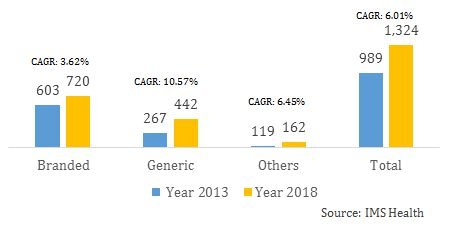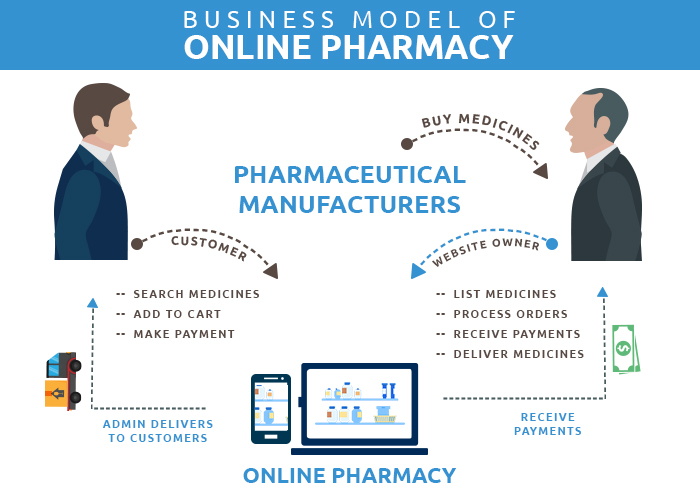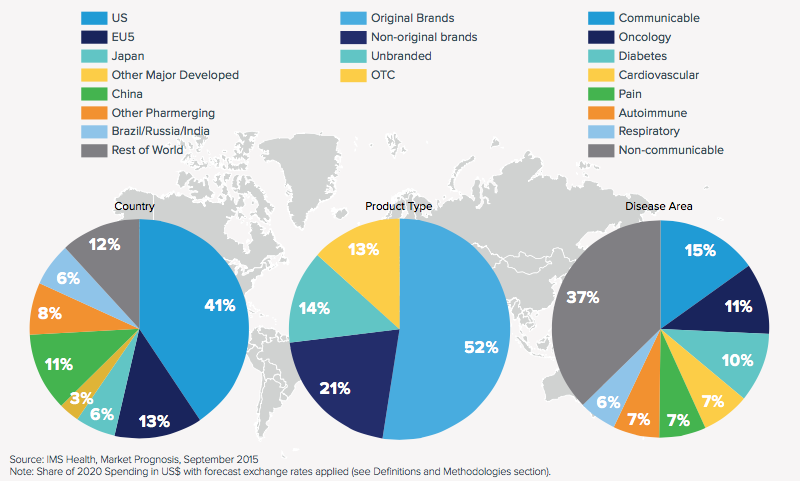The past few years have seen an exponential increase in smartphone usage and as a result, various industries have gone through major transformations; the pharmaceutical sector being one of them. Mobile healthcare solutions have started to play an important role in the pharma market and are poised to change the way healthcare is approached. It is a relatively recent development, but has the potential to build and bolster a more efficient healthcare system. And the numbers speak for themselves: more than 60% of smartphone users use their smartphones to search for information about different health conditions. They also look for help with symptoms of different illness and medicines to take, according to a recent study that was conducted. Players in the pharma business have identified the potential in adopting technology to further their growth.

This growing evolution in digital applications to monitor and improve health is setting the foundation for new strategies and planning in pharma marketing, as it opens doors to previously unexplored avenues. They are dumping old models of marketing in favour of new technology, which ranges from scientific detailing and doctors to using newer algorithms for better insights into issues like patient compliance. Both physicians and patients are heavy users of mobile devices, and it only makes sense to shift the conversation onto this platform not only to make it more efficient, but also to improve accessibility. With regards to accessibility, it could have far flung (and positive) implications for people who do not have access to basic medical care for various reasons. With services like prescription uploading, medicine delivery, video chat between doctor and patients, and several other features, the future of the pharmaceutical industry looks to be very bright.
Changing Trends
This growing evolution in digital applications to monitor and improve health is setting the foundation for new strategies and planning in pharma marketing, as it opens doors to previously unexplored avenues. They are dumping old models of marketing in favour of new technology, which ranges from scientific detailing and doctors to using newer algorithms for better insights into issues like patient compliance. Both physicians and patients are heavy users of mobile devices, and it only makes sense to shift the conversation onto this platform not only to make it more efficient, but also to improve accessibility. With regards to accessibility, it could have far flung (and positive) implications for people who do not have access to basic medical care for various reasons. With services like prescription uploading, medicine delivery, video chat between doctor and patients, and several other features, the future of the pharmaceutical industry looks to be very bright.
Another advancement to facilitate a patient’s compliance is the creation of what is referred to as the ‘smart pill,’which has the ability to communicate with one’s smartphone. The smart pill’s internal chip and a sensor placed on the user’s body allow vital information to be relayed to a nurse or physician, and collected on any smartphone that is connected to the sensor. Similarly, notifications can be sent to relatives or caregivers if a patient forgets to take a pill, refill a subscription or is unresponsive for long periods of time. The ultimate aim is to prompt a change in behavior. Although many of these applications are free to download, one challenge that is difficult to overcome is that non-compliance often relates to the elderly, who have a lower rate of smartphone ownership and knowledge of how to use it. The younger generation, on the other hand, is taking to these apps easily because they are tech savvy and appreciate the convenience of these platforms.
Digital Channels of Communication
There are three main areas where digital developments will drive value for pharma companies, building on what we see as the key components of digital success: an ability to deliver more personalized patient care, engage more fully with physicians and patients, and use data to drive superior insight and decision making.
Personalized Care: The ability to personalize interactions with consumers is a key value driver from digital technology in any industry. In pharma, this value will be realized in large part through the use of sensors and digital services to provide customised care around the clock. Several companies already offer integrated products and services; WellDoc, for example, has launched BlueStar, the first FDA-approved mobile app for managing type 2 diabetes, while AliveCor has built a smartphone-based electrocardiogram.
Doctor-patient Interaction: The power of the internet is such that it allows patients to communicate with their doctors even from remote areas and diagnose conditions that they might otherwise not be able to, ensuring that (as often as possible) the highest standard of healthcare is delivered. Patients are already starting to use patient portals for their medical records and to communicate with their physicians; NeoCare Solutions, developed by Aetna, gives new parents returning home with infants from the intensive care unit on-demand coaching from a neonatal nurse.
Advanced Analytics: Pharma companies sit on a wealth of information that can be used to improve and develop products that will better serve their consumer base. Some companies have realised the potential in this and have started mining their data sets to improve their pipelines, products and strategies. Areas like R&D and sales & marketing will benefit greatly from the information that this produces, helping companies innovate faster to stay on top of their game.

A New Direction
Mobile applications are a relatively low cost way for pharmaceutical companies to strengthen consumer engagement by offering personal and relevant information. Such as assisting patients with finding providers in their area or making it easier to deliver medicines in a shorter amount of time. Mobile Health applications can also improve preventive care: research has found that in the current digital age, patients are much less dependent on their doctors for advice and are increasingly able and willing to take greater control of their own health. They feel empowered by the vast amount of health information available online and on apps, and by the array of health and fitness wearables such as FitBit and Apple Watch. In one survey, more than 85 percent of patients said they were confident in their ability to take responsibility for their health and knew how to access online resources to help them do so.
Furthermore, patients can use mobile technology to better manage long-term conditions such as diabetes and hypertension effectively and with more information that allows them to make better decisions. Weight loss applications that record daily caloric intake and fitness applications that measure calories burned during workouts are examples of applications that not only help you keep you healthy, but encourage you to make better lifestyle choices as well. Mobile applications capable of monitoring blood glucose levels are serving as useful tools for diabetics as well.
These developments can also enable pharmaceutical marketers to improve brand awareness by supporting consumers who are taking steps to proactively improve their health outcomes. This is possible because mobile devices can also assist with public education awareness campaigns and reach a wider audience. This is necessary in an interconnected world. The ability to identify the geographic location of a rapidly spreading illness may prevent hospitalizations and save lives. Patients and doctors in developing countries have been quick to embrace mobile technology, making it easier for pharmaceutical companies to reach traditionally underserved populations.
Historically, pharmaceutical companies have always controlled both the generation and dissemination of information about their products and services, which has sometimes led to more more harm than good. Because information is available from a single source, and one that is biased, people might be influenced to make the wrong decision. However, digital technologies have weakened that control by making way for a variety of new and independent information channels that allows consumers to make better informed decisions. There are online communities for sharing and discussing patients’ experiences, apps and sensors to monitor the impact of therapy on a patient’s daily life. With the way things are rapidly progressing, it is safe to say that what we are seeing is only the tip of the iceberg.

Bottomline
The technological advancements in mobile healthcare are fostering conditions that are favorable to increased patient engagement and compliance. They are new diagnostic tools that allow for easier interaction with physicians can help with overall wellness and preventive care. Furthermore, medical professionals who use mobile technology to collect data from their patients and improve documentation efforts are also benefiting from these developments. It reduces the time spent on repeating information and limits the number of mistakes that can take place. Pharmaceutical companies are aiming to influence consumer healthcare decisions and are using mobile technology to connect their products with the proper doctors and patients. As the marketplace becomes more competitive, a key challenge for software and technology companies serving the pharmaceutical industry will be to develop and market their mobile solutions effectively to stay ahead of the curve.






